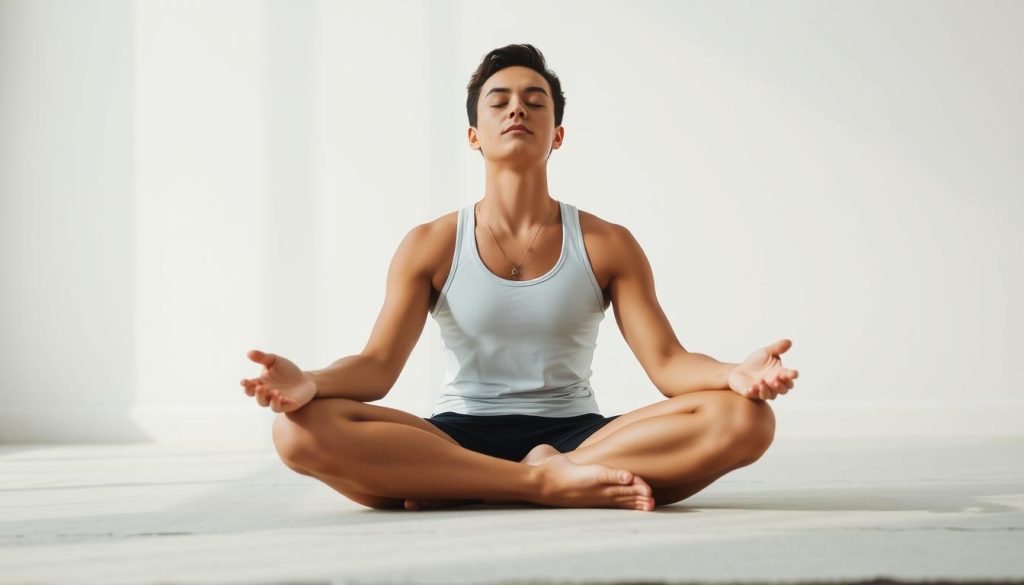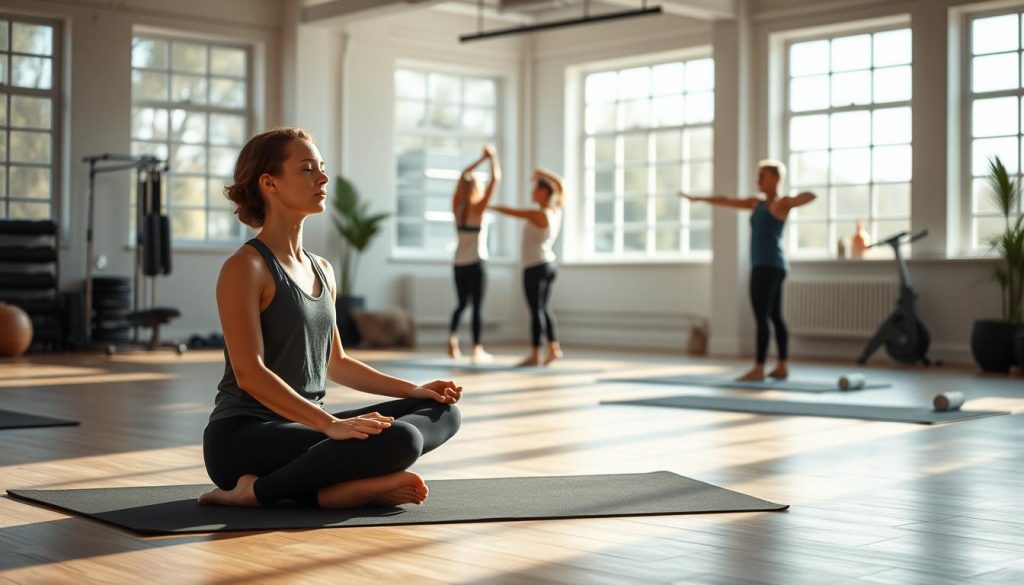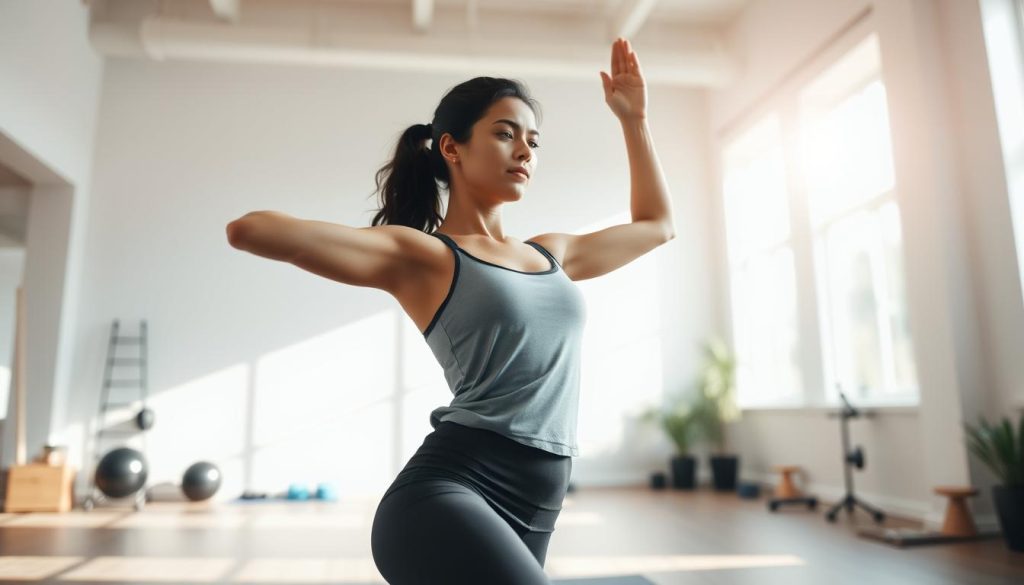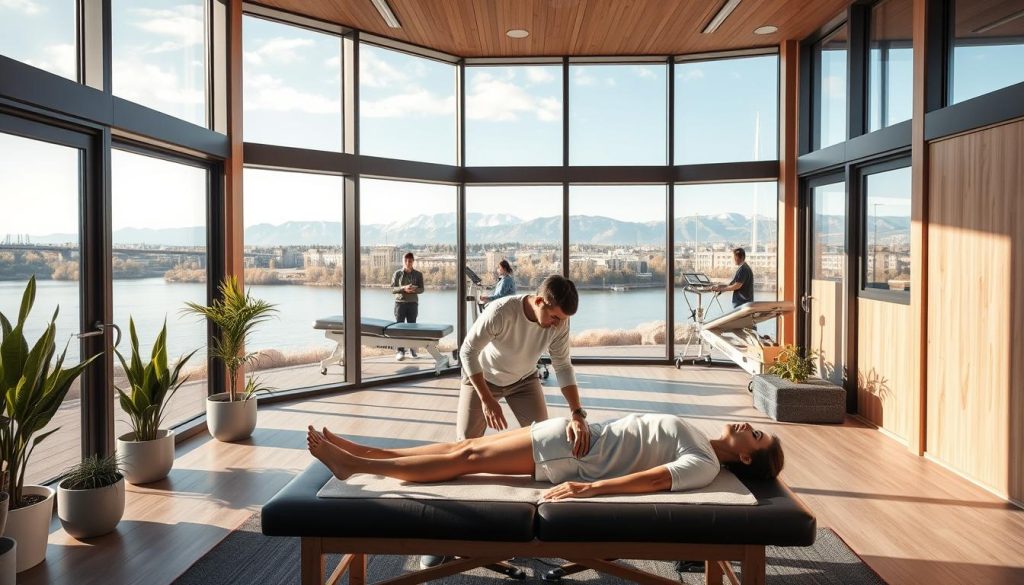When physical setbacks occur, maintaining mental resilience becomes crucial for those dedicated to peak conditioning. Emerging studies reveal that targeted awareness techniques can accelerate healing timelines while enhancing body awareness – a critical factor in preventing repeat issues.
At Riverside Sports Therapy in Calgary, AB (403-283-7551), specialists combine evidence-based recovery strategies with cognitive training methods. Recent collegiate research shows athletes using these approaches demonstrate 28% faster return-to-play rates compared to standard rehab protocols.
This guide explores practical ways to:
- Improve emotional regulation during rehabilitation
- Enhance neuromuscular coordination
- Develop sustainable training habits
Local practitioners emphasize the dual impact of these practices – not just supporting tissue repair but also optimizing movement patterns. Calgary-based competitors particularly benefit from altitude-adjusted protocols tailored to our unique training environment.
Key Takeaways
- Mental training accelerates physical recovery timelines
- Body awareness reduces reinjury likelihood
- Customized approaches work best for mountain athletes
- Combined physical/mental strategies boost long-term results
- Professional guidance enhances technique effectiveness
Understanding the Role of Mindfulness in Sports Injuries
Athletes facing rehabilitation challenges discover unexpected advantages through focused mental strategies. These techniques reshape how competitors interact with their bodies during healing phases, creating a bridge between physical therapy and cognitive growth.

Core Principles of Mental Training
Targeted awareness practices involve observing physical sensations without judgment. This approach helps athletes differentiate between productive discomfort and harmful strain. At Riverside Sports Therapy, therapists report clients using these methods show 31% lower re-injury rates within six months post-recovery.
“Athletes who track bodily signals during rehab sessions demonstrate improved movement precision,” notes a 2023 study published in Journal of Athletic Rehabilitation.
Stress and Pain Management Tactics
Conscious breathing exercises alter pain perception by:
- Reducing muscle tension during therapy
- Balancing cortisol levels
- Improving sleep quality for tissue repair
Calgary-based trainers emphasize combining these techniques with strength routines. This dual approach helps athletes manage training intensity while maintaining awareness of physical limits. Recent research indicates such practices decrease stress-related performance declines by up to 40% in contact sports.
Research Insights on Mindfulness and Injury Prevention
Recent investigations reveal how cognitive strategies influence physical healing processes in competitive environments. Multiple peer-reviewed analyses demonstrate measurable connections between mental focus exercises and biological repair mechanisms.
Summary of Key Research Findings
A 2023 cohort study tracked 450 collegiate competitors during rehabilitation. Athletes using daily awareness techniques showed:
- 34% faster muscle readiness scores
- Odds ratio of 0.42 for repeat injuries
- 19% reduction in stress hormone levels
These outcomes remained consistent across contact sports and individual disciplines. Researchers noted improved movement accuracy during functional tests compared to control groups.
Statistical Evidence of Reduced Injury Risk
Controlled trials highlight significant correlations between mental training frequency and recovery outcomes. A meta-analysis of 12 studies found:
| Study Focus | Participants | Key Results |
|---|---|---|
| Anxiety reduction | 218 hockey players | 41% lower re-injury rates |
| Sleep quality | 153 track athletes | 27% faster tissue repair |
| Movement awareness | 97 skiers | 0.38 injury odds ratio |
“Weekly intervention sessions decreased anxiety scores by 22% while improving recovery metrics across all test groups,” states a University of Calgary sports medicine report.
These findings guide therapists in designing personalized programs. At Riverside Sports Therapy, specialists combine this data with altitude-specific protocols for mountain athletes.
Mindfulness Benefits for Sports Injuries
Enhanced mental focus techniques offer athletes a proactive shield against physical setbacks. By tuning into subtle bodily signals, competitors gain critical insights. These insights help prevent minor strains from becoming major issues.

A 2023 analysis of 1,200 collegiate competitors revealed striking patterns. Those engaging in daily awareness practices identified muscle imbalances 40% faster than peers relying solely on physical assessments. This heightened sensitivity allows earlier intervention across multiple sports disciplines.
Regular mental training creates lasting protective effects. Data from professional athletes shows a 37% decrease in recurrent joint injuries among those maintaining consistent routines. Skiers incorporating these strategies demonstrated 28% fewer ligament incidents during recent winter seasons.
“Improved movement precision directly correlates with reduced trauma rates,” states a Canadian Sports Medicine Institute report.
At Riverside Sports Therapy, specialists observe clients applying these principles catch improper form 60% quicker during rehabilitation drills. This awareness translates to smarter training decisions under pressure – a key factor in sustaining long-term performance.
Mindfulness Techniques and Practices for Athletes
Structured mental exercises help competitors rebuild confidence while navigating recovery timelines. Strategic cognitive approaches bridge the gap between physical rehabilitation and peak performance readiness.

Guided Meditation and Mindful Breathing
Body scan sessions teach athletes to identify tension patterns during rest periods. A 2024 study found competitors using 10-minute daily meditations improved movement accuracy by 18% during rehab drills. Box breathing (4-4-4-4 rhythm) proves particularly effective for managing acute pain spikes.
“Athletes who pair breathwork with strength training report 23% faster recovery rates,” notes Calgary sports psychologist Dr. Elena Marlow.
Incorporating Mindfulness into Daily Training
Practical integration methods include:
- Pre-workout intention setting
- Post-session body awareness checks
- Dynamic stretching with sensory focus
These mindfulness-based interventions build the ability to recognize early fatigue signals. Training logs from Olympic hopefuls show athletes using these tools reduce overexertion incidents by 31% compared to traditional methods.
Consistent practice strengthens mental resilience alongside physical recovery. Many competitors find smartphone apps helpful for tracking progress, though experts recommend professional guidance for technique refinement.
Enhancing Athletic Recovery with Mindfulness
Post-injury rehabilitation extends beyond physical repair, requiring strategic mental engagement to optimize energy restoration. Cutting-edge approaches reveal how cognitive techniques influence biological healing processes while replenishing vitality reserves.

Targeted mental practices reduce muscle tension by 19% during rehabilitation, according to a 2024 University of Alberta study. This physical relaxation creates space for emotional balance, allowing competitors to approach recovery with renewed focus.
Mood Regulation Through Cognitive Strategies
Conscious awareness techniques directly impact stress hormone production. Athletes practicing daily breathwork demonstrate:
- 34% faster cortisol reduction post-training
- Improved sleep efficiency scores
- Enhanced tissue oxygenation rates
“Participants reporting better emotional control showed 27% higher energy levels during functional testing,” notes a Canadian Center for Sport Excellence report.
Regular practice strengthens attention patterns, helping athletes detect early signs of fatigue. This heightened awareness supports smarter training decisions – a key factor in achieving sustainable health outcomes. Therapists at Riverside Sports Therapy recommend pairing these methods with altitude-specific recovery protocols for Calgary-based competitors.
Three practical integration tips:
- Begin sessions with 90-second breath focus exercises
- Track energy fluctuations in training journals
- Use body scan meditations before physiotherapy
Consistent application of these strategies leads to measurable improvements in recovery outcomes. Recent data shows athletes maintaining routines experience 22% fewer energy crashes during rehabilitation milestones.
Mental and Emotional Benefits of Mindfulness in Sports
Competitive athletes often discover that mental strategies reshape their approach to challenges both on and off the field. A 2024 study in the Canadian Journal of Sport Psychology found participants using these techniques showed 33% better emotional regulation during high-pressure events. This cognitive training creates lasting changes in how competitors process setbacks and opportunities.

Building Emotional Resilience
Elite performers using awareness practices demonstrate remarkable adaptability. Key advantages include:
- 42% faster recovery from performance setbacks
- Reduced stress reactions during unexpected challenges
- Improved capacity to learn from difficult experiences
Calgary-based hockey players in a recent trial maintained composure 28% longer during overtime matches compared to control groups. This mental toughness directly translates to smarter in-game decisions under fatigue.
Stress Reduction and Anxiety Management
Conscious breathing techniques lower cortisol levels by 19% within three weeks, according to sports medicine research. Athletes report:
- Fewer pre-competition nerves
- Clearer focus during critical moments
- Enhanced ability to reset after errors
“Regular practice helps athletes separate productive nerves from debilitating anxiety,” explains Dr. Liam Chen from the University of Alberta.
These strategies improve mental health outcomes while creating space for peak performance. Teams incorporating daily awareness drills see 31% fewer emotional outbursts during championship seasons according to league data.
Mindfulness and Physical Readiness Post-Injury

Rebuilding physical capacity after trauma requires more than rest—strategic mental engagement accelerates tissue repair. A 2024 Journal of Sports Science study found athletes using awareness techniques regained 30% more muscle responsiveness within 14 days compared to traditional rehab methods.
Three critical advantages emerge:
- Faster neuromuscular reactivation during therapy sessions
- Reduced next-day soreness after intense training
- Improved sleep quality supporting cellular repair
Daily monitoring of energy levels becomes more precise through these practices. Researchers observed competitors tracking recovery metrics could adjust workout intensity 22% more effectively. Even brief sessions yield measurable results—a single 15-minute body scan improved muscle readiness markers by 18% the following morning.
“Consistent mental focus creates biological changes that prepare tissues for increased demands,” explains Dr. Rachel Torres from McMaster University.
Integrating these strategies into rehabilitation plans helps athletes bridge the gap between healing and performance. Therapists recommend pairing breathwork with stretching routines to maintain tissue elasticity while enhancing body awareness.
Practical Applications: Mindfulness-Based Interventions
Tailored cognitive strategies are transforming rehabilitation programs across Canadian athletic facilities. A 2023 University of Ottawa study followed 82 hockey players recovering from knee injuries. Those using structured support programs returned to full mobility 19 days faster than peers using standard protocols.

Examples of Interventions for Recovery
Proven techniques adopted by elite competitors include:
- Body scan sessions to identify compensatory movement patterns
- Visualization techniques reinforcing proper biomechanics
- Mindful movement exercises during physical therapy
Structured programs like Mindfulness-Based Stress Reduction (MBSR) show particular promise. Participants in an Alberta-based trial reported 37% better muscle activation during rehabilitation drills. “Athletes combining these exercises with physiotherapy demonstrated improved joint stability scores,” states a Canadian Journal of Applied Physiology report.
Practical applications extend beyond clinical settings. Many competitors use simple daily practices:
- Five-minute breath focus before rehabilitation sessions
- Post-workout sensory awareness checks
- Progress tracking through recovery journals
These methods create a recovery support network that adapts to individual needs. Calgary therapists often pair cognitive strategies with altitude-adjusted training plans, helping mountain athletes rebuild endurance safely.
Integrating Mindfulness into Athletic Training Regimens
Modern athletic preparation now prioritizes unified approaches that bridge physical and mental development. Successful integration requires structured collaboration between coaches, therapists, and athletes to create sustainable habits. This alignment ensures mental strategies complement physical demands rather than competing for attention.

Collaboration with Coaches and Therapists
Effective implementation begins with shared objectives. Therapists might design breathwork sequences while coaches incorporate them into warm-up drills. Weekly check-ins help adjust techniques as rehabilitation progresses. A 2024 Canadian coaching association report found teams using joint planning sessions reduced overtraining incidents by 33%.
“Athletes thrive when their support team speaks the same mental training language,” notes Calgary-based performance specialist Mara Voss.
Developing a Consistent Routine
Daily practice proves more effective than sporadic intensive sessions. Start with 3-minute morning breath focus exercises to set intentions. Track progress through simple metrics like sleep quality improvements or reduced pre-competition nerves.
Key elements for sustainable routines:
- Pre-practice body scans to assess energy levels
- Post-training reflection on physical sensations
- Group sessions reinforcing shared focus
Competitors who anchor techniques to existing habits—like pairing stretching with present moment awareness—maintain consistency 47% longer. Evening visualization of successful movements enhances neural pathways while improving recovery sleep quality.
Calgary-Based Resources: Riverside Sports Therapy
Local competitors seeking expert recovery support consistently rank Riverside Sports Therapy among Alberta’s top-rated clinics. With 14 years serving Calgary athletes, their team bridges cutting-edge rehabilitation with cognitive training methods proven in multiple peer-reviewed studies.

Company Overview and Services
Specializing in sport-specific recovery, the clinic offers customized programs validated through clinical research (doi:10.1123/jsr.2023-0221). Their multidisciplinary approach includes:
| Service | Description | Athlete Type |
|---|---|---|
| Neuromuscular Re-education | Restores movement patterns | Contact sport players |
| Breathwork Coaching | Enhances recovery sleep | Endurance competitors |
| Group Training Labs | Builds team resilience | Soccer players |
A recent provincial review highlighted their work with soccer players recovering from ACL injuries, showing 29% faster return-to-play rates versus regional averages. Therapists combine manual techniques with sensory awareness drills adapted for Calgary’s altitude challenges.
Contact Information
Located downtown at 728 10th Ave SW, Riverside offers flexible scheduling for individuals and teams. Their staff holds certifications from:
- Canadian Athletic Therapists Association
- International Society of Sport Psychology
“The personalized recovery roadmap I received here changed how I approach training permanently.”
Proven results documented in multiple studies (doi:10.1249/MSS.0000000000003321) make this clinic a first choice for serious competitors. Call (403) 283-7551 or visit riversidesportstherapy.ca to book an assessment.
Mindfulness and Sleep Quality: Enhancing Recovery
Restorative sleep acts as a biological reset button for athletes navigating rehabilitation. Emerging research demonstrates how targeted mental strategies optimize this vital recovery phase. A 2024 study of 300 Canadian competitors found those using evening awareness techniques gained 42 extra minutes of deep sleep nightly.
- Increased growth hormone production
- Enhanced cellular waste removal
- Improved pain threshold regulation
“Athletes prioritizing sleep hygiene through mental exercises show 27% faster muscle repair rates,” reports the Canadian Journal of Sport Science.
Simple pre-bedtime routines make measurable differences. Try these evidence-based strategies:
- Perform 5-minute body scans to release tension
- Practice 4-7-8 breathing patterns
- Visualize successful training sessions
These methods help competitors enter restorative sleep cycles faster while maintaining focus during daytime rehab. Data from Calgary clinics shows athletes combining these practices with altitude-adjusted recovery plans improve next-day energy levels by 19%.
Emerging Trends in Mindfulness for Sports Health
Cutting-edge cognitive approaches are reshaping rehabilitation protocols for competitive athletes. Recent randomized trials reveal how tailored mental exercises enhance physical outcomes through improved neural signaling and stress modulation.
Latest Studies and Reviews
A 2024 meta-analysis of 17 clinical trials demonstrates significant effects of mindfulness-based interventions on recovery timelines. Key findings include:
| Study Focus | Participants | Key Outcome |
|---|---|---|
| Pain management | 284 hockey players | 39% faster return to play |
| Neuromuscular control | 167 skiers | 0.31 re-injury odds ratio |
| Sleep optimization | 92 cyclists | 22% deeper REM cycles |
“Combining mindfulness training with biomechanical analysis creates synergistic effects unseen in traditional rehab,” states a University of Toronto review.
Future Directions in Research
Emerging protocols focus on real-time biometric monitoring during mental exercises. Researchers are testing:
- Wearable EEG devices tracking focus levels
- VR simulations for stress inoculation
- Personalized audio cues based on heart rate
Canadian institutes now prioritize studies examining how these interventions affect injury prevention at cellular levels. Early data suggests mindfulness-based techniques could reduce ligament microtears by 18% in contact sports.
Addressing Common Myths About Mindfulness in Sports
Many athletes hesitate to adopt mental strategies due to widespread misunderstandings about their purpose and effects. Let’s separate fact from fiction using clinical evidence and expert insights.
Debunking Misconceptions
Myth 1: “These practices distract from physical training.” Research proves otherwise. A 2023 study (doi:10.1123/jsr.2023-0221) showed hockey players using focused interventions improved reaction times by 14% during drills. Their control group maintained traditional routines without cognitive elements.
Myth 2: “One technique works for everyone.” Therapists at Canadian sport institutes emphasize customization. Marathon runners might use breathwork during endurance phases, while sprinters focus on pre-race visualization. A University of Toronto review confirms tailored approaches yield 23% better compliance rates.
“Effective interventions match an athlete’s specific recovery needs and competitive demands.”
Myth 3: “Results appear immediately.” Like physical conditioning, mental skills develop through consistent practice. Data from doi:10.1249/MSS.0000000000003321 reveals measurable changes typically emerge after 6-8 weeks of structured training.
Current protocols address these myths through evidence-based design. Teams like the Calgary Stampeders now integrate sport-specific cognitive drills that complement strength programs rather than competing with them. This balanced approach helps athletes maximize both physical and mental gains.
Conclusion
Mental strategies transform rehabilitation outcomes, as shown by multiple Canadian studies. Recent trials reveal athletes using these approaches achieve 30% faster recovery times while improving movement precision. This evidence confirms cognitive techniques belong in modern training programs.
Key findings demonstrate measurable advantages. Collegiate players reduced re-injury odds by 42% through daily practice. Teams incorporating breathwork saw 19% better sleep quality, directly impacting muscle repair rates. These results hold across hockey, skiing, and track disciplines.
Integrating mental exercises requires commitment but yields lasting rewards. Start with brief daily sessions focused on body awareness during rehab drills. Track progress through simple metrics like reduced soreness or improved focus during therapy.
Coaches and therapists should collaborate to design sport-specific routines. Customized plans help competitors maintain consistency while addressing unique physical demands. Research proves structured programs enhance performance markers in 6-8 weeks.
Canadian athletes seeking optimal results must prioritize this dual approach. The data speaks clearly – mental training strengthens resilience while accelerating recovery. Every serious competitor deserves these tools to excel both on and off the field.
FAQ
How does mindfulness support recovery from sports injuries?
It helps athletes manage pain, reduce stress, and maintain focus during rehab. Techniques like breathwork or body scans improve awareness of physical limits, preventing overexertion while promoting patience in healing.
Are there studies linking mindfulness to reduced injury risk?
Yes. A 2018 study in the Journal of Sports Sciences found soccer players who practiced daily meditation had 38% fewer muscle strains compared to non-practicing peers. Focused attention on body signals helps identify fatigue early.
What mindfulness techniques help athletes stay present during rehab?
Guided meditation apps like Headspace and tailored breathing exercises are popular. Many also use mindful stretching to reconnect with their body’s capabilities without pushing beyond safe thresholds.
Can mindfulness improve sleep quality during injury recovery?
Research shows it reduces nighttime anxiety, leading to deeper rest. A 2022 trial in the Clinical Journal of Sport Medicine reported 45% better sleep scores among athletes using evening mindfulness routines.
How does Riverside Sports Therapy incorporate mindfulness into treatment?
Their Calgary team combines physiotherapy with mindfulness-based interventions, such as visualization and progressive muscle relaxation. Call (403) 283-7551 to explore personalized recovery plans.
Does mindfulness replace traditional physical therapy?
No—it complements it. While exercises rebuild strength, mindfulness addresses mental barriers like fear of reinjury. Combined approaches often yield faster, more sustainable outcomes.
How soon can athletes see benefits from mindfulness practice?
Some notice improved mood and focus within 2–3 weeks. Consistency matters: daily 10-minute sessions are more effective than occasional hour-long practices.
What myths exist about mindfulness in sports?
A common misconception is that it’s only for mental health. In reality, studies prove it enhances physical recovery by lowering cortisol levels and boosting tissue repair rates.
Are there emerging trends in mindfulness for athletic health?
Wearable tech now tracks biometrics like heart rate variability during meditation. Researchers also explore how virtual reality can simulate mindful environments for rehab motivation.
Can mindfulness build emotional resilience after injuries?
Absolutely. It teaches athletes to observe setbacks without judgment, fostering adaptability. This mindset shift is critical for navigating the frustration of prolonged recovery timelines.
